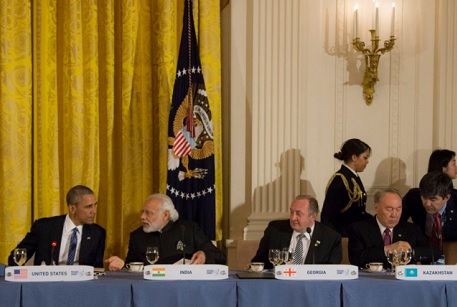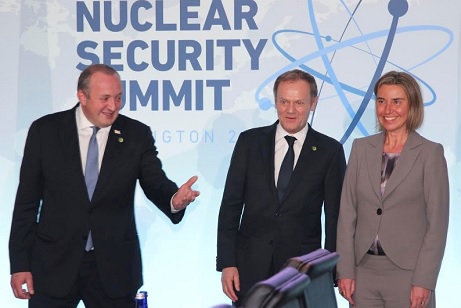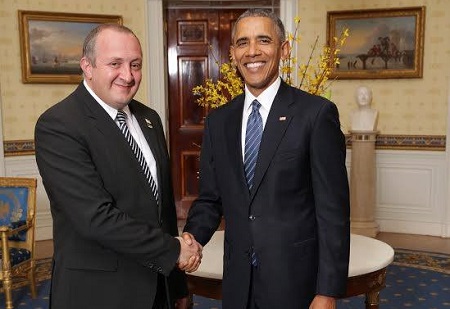Dinner with Obama: President Margvelashvili highlights Georgia’s role in world nuclear security

Georgia’s President Giorgi Margvelashvili has spoken at the Nuclear Security Summit dinner hosted by US President Barack Obama in Washington yesterday.
Margvelashvili addressed more than 50 world leaders and talked about what efforts his country had made in order to ensure nuclear security.
The President said one of the world’s greatest challenges was the threat that nuclear materials and technologies could end up in terrorists’ hands.
In that context, he briefly elaborated the steps Georgia had taken since the last Hague Summit to prevent nuclear terrorism and to further meet the international obligations.
Nuclear Security Summit Dinner Hosted by President @BarackObama@WhiteHouse#NSS2016@NSS2016pic.twitter.com/HR1ee9B7rT
— President Of Georgia (@MargvelashviliG) April 1, 2016
"We passed the new "Law over Control on Military and Dual Use Items” that brought Georgia’s legislation on strategic export control in line with EU standards,” he said.
"At the same time, we adopted the new "Law on Radioactive Waste,” and strengthened state control over nuclear and radiation safety and security. Also, Georgia formed a new Agency for Radioactive Waste Management to operate both centralised storage and disposal facilities.”
Margvelashvili stressed according to the agreement with the International Atomic Energy Agency, Georgia approved the 2015-2019 Integrated Nuclear Security Support Plan (INSSP), and elaborated the national strategy and action plan to reduce chemical, biological, radiation and nuclear (CBRN) risks.
"And most importantly, as considered in the communiqué of the 2014 Nuclear Security Summit, we repatriated the high-enriched uranium with strong support of the US and International Atomic Energy Agency,” he said.
"Consequently, today I represent Georgia as a non-nuclear state.”
Margvelashvili added however, the proliferation of the WMD (weapons of mass destruction)-related materials and technologies remained a subject of serious concern for Georgia.
"Taking into account our proximity to the regions that pose a high risk of proliferation, Georgia’s growing transit potential could become a matter of increased interest for certain international criminal groupings,” he said.
Margvelashvili also highlighted that both the regional and global nuclear security could suffer substantially without placing the respective control mechanisms and international presence over the Georgian territories of Abkhazia and Tskhinvali region (South Ossetia), which currently were beyond the effective control of the legitimate central authorities, and where international control mechanisms did not extend due to the ongoing Russian occupation.
"To be specific, in recent years we had several recorded attempts of smuggling nuclear and radioactive materials via Georgia’s occupied regions, and that further amplifies the sense of danger,” Margvelashvili said.
"Fortunately, these illegal activities were duly prevented by Georgian law enforcement agencies,” he added.
"However, let me once again underscore that in the absence of the international presence on Georgia's occupied territories, it has become virtually impossible to conduct any type of verification activities on the ground. As a result, the risk of proliferation of the WMD-related materials in and from these occupied regions has tremendously increased.”
The President reiterated Georgia’s stance, as conveyed at the Hague Summit, that this concern was not for individual countries alone but for the international community as a whole.
"Thereby, we urge you to join us in paying this challenge the attention it deserves, and immediately addressing this pressing problem,” he said.
Read the Georgian President’s full address here.
 Tweet
Tweet  Share
Share


